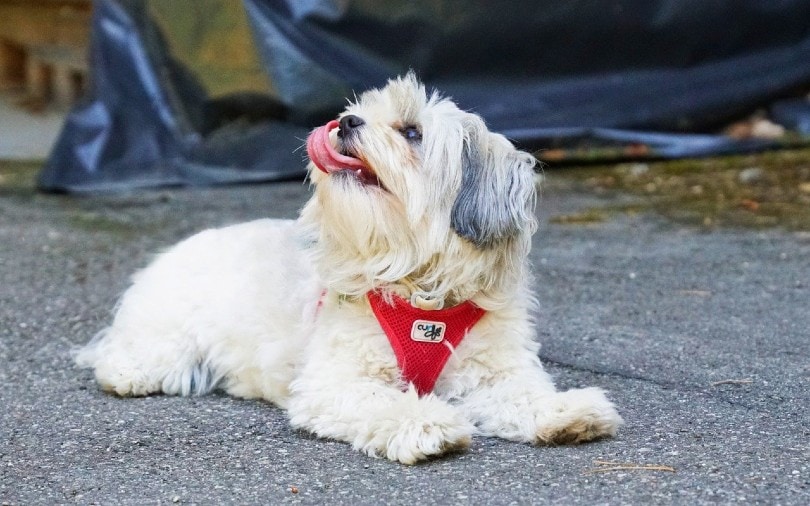Click to Skip Ahead
Havanese dogs are a silky-haired toy breed with spirited personalities. Although the Havanese breed is classed as a toy breed, they’re usually more serene than other dogs in this class and are more well-known for their peppy walk rather than yappy barking. While they’re attached and loyal to their owners and have strong social needs, that doesn’t mean they’ll bark at strangers. They might bark to alert their owners when people approach, but they’re not typically known as yappy dogs that bark for no reason.

The 3 Reasons a Havanese Dog Would Bark
There are a few reasons why your Havanese might be barking. Alerting or territory protection are common reasons, such as alerting their owners to a stranger approaching or letting an approaching dog know it’s not okay to come any closer.

1. Separation Anxiety
Separation anxiety is another reason why a Havanese may bark. Not all dogs suffering from separation anxiety will bark, and not all Havanese will develop separation anxiety. However, it’s easy for Havanese to get anxious if they’re left alone. These dogs need lots of attention and affection; if they are left alone for even a short while, they can get overly anxious, which can lead to barking that can sometimes become compulsive.
2. Poor Socialization
Poor socialization can also cause barking due to fear or aggression. All dogs, no matter the breed, need socialization during puppyhood. Getting your dog used to various people, objects, and situations is crucial to a dog becoming a confident and comfortable member of society. If a dog isn’t socialized, it can become anxious, fearful, or aggressive, which is the same for the Havanese. This can lead to barking, which can be hard to remedy.
3. Attention Seeking
Attention-seeking barking can be a little more likely for the Havanese as they are very much a “people” breed. However, this is a learned behavior, and attention-seeking barking often gets results. Any reaction from an owner (positive or negative) when their dog barks reinforce the behavior each time, often without the owner even realizing it. Even negative attention, such as telling your Havanese “no,” can be a win for them. It still gives them the attention from you that they crave. A more acceptable form of attention-seeking barking can be a greeting as you come in the door.

The 7 Ways To Stop Your Havanese From Barking
Stopping your Havanese from barking will depend on the reason they’re doing it. Some causes of barking are easier to stop than others, and there are different methods to consider. In any case, a calm, assertive, and positive approach is key.

1. Stopping Alert Barking
Havanese can bark to alert their owners, as some dogs are more territorial or watchful. To combat this, effective training in redirection is ideal. For example, instead of barking, you can ask your Havanese to perform an action like “give paw.” This allows them to express their feelings less disruptively and offers many opportunities for positive reinforcement. Make sure you give your Havanese a treat or cuddles if they get it right!
2. Stopping Anxiety, Separation, Or Compulsive Barking
Anxiety or separation barking can be a complex issue to fix. Help from a qualified expert in dog behavior is sometimes needed, as anxiety barking can be difficult to remedy once it’s taken hold.
3. Training
Owners can start training their Havanese to be more relaxed when home alone by leaving for short periods. For example, owners can start by grabbing their keys and putting on their coats but staying home. Next, they can do the same but walk out the door before coming back inside. These small actions are signals that your Havanese will look for if they are anxious or suffer from separation anxiety, which can trigger barking. I
f you leave but come back immediately, this might bring them up short, stopping the barking. Gradually build up the time you’re out of the house, such as going out for five minutes, then ten, etc. Give them lots of praise each time you come back and they don’t bark, but completely ignore them if they do.
4. Repetition
Repeating this over multiple days can change your Havanese’s expectations and build their resilience, making it easier on them when you leave home. Making sure your dog is relaxed before leaving also helps; leaving a puzzle toy out is great to provide a distraction.

5. Toys and Radios
Compulsive barking can sometimes be the product of boredom, so a pet-safe, peanut butter-stuffed toy can make a big difference quickly. Some dogs find radios left on a talk show can be comforting, and if all else fails, you can hire a dog sitter to help de-stress your pup and keep them company until you get home.
6. Reducing Attention-Seeking Barking
Stopping yourself from giving your dog attention can be hard when they’re barking. So, the best thing to do is wait for your dog to stop barking before giving them any attention or even acknowledging that they are barking.
Giving them lots of praise when they’re quiet can also help, as you’re helping them to realign their thoughts. With repetition, a dog can learn that if they bark, nothing will happen, so it’s not worth doing. On the other hand, if they are calm and quiet, they get attention and treats.
7. Stopping Fear Barking
Fear barking is tricky to remedy, so you might have to consult a behavioral expert to get their advice. Positive reinforcement and exposure to different things, situations, and people in a safe, calm environment can stop fear barking. However, correcting the behavior can take longer, depending on the Havanese’s experiences. For example, dogs that have been abused can have deep-rooted fears that can be hard to manage.

What Are Anti-Bark Collars?
Anti-bark collars are special behavioral tools that stop unwanted behavior through negative reinforcement. They punish barking by repeatedly giving the dog a negative stimulus (such as an electric shock), so the dog eventually avoids performing the behavior. There are three types of anti-bark collars:
Shock collars: Shock collars send a low-level electric shock across a dog’s neck when it detects barking.
Citronella collars: These anti-bark collars spray citronella into the air around the dog if its microphone detects barking.
Ultrasonic collars: Ultrasonic collars also use a microphone to detect barking. These collars issue a high-frequency ultrasonic tone when they detect barking, which is too high for people to hear. Sometimes, ultrasonic collars are combined with shock collars.

Are Anti-Bark Collars Effective for Havanese?
A study by the Cornell College of Veterinary University found that of two anti-bark collars tested (shock and citronella), citronella collars were the most effective at stopping dogs from barking. Owners in the study cited citronella stopped their dogs from barking the most, but not all of them stopped. The same study also found that half of the dogs given a shock collar showed no reduced barking behavior.
This shows that while there has been some success with citronella collars, punishment collars like those mentioned above are ineffective ways to stop barking. Citronella collars can also sometimes pick up another dog’s bark, meaning the poor dog wearing the collar gets sprayed for no reason. These collars don’t train dogs not to bark; they merely punish the behavior.
Debarking: Why It’s Not Acceptable
Debarking (or bark softening/ devocalization) is a mutilation procedure that severs or removes portions of a dog’s vocal cords or folds. This produces a bark that’s almost a whisper which is soft, often higher in pitch, and much quieter (it doesn’t stop dogs barking).
Debarking is used when excessive barking becomes a real issue for owners, whether in a domestic setting or due to a court order. However, not only does debarking not stop a dog from barking, it can cause long-lasting pain and psychological stress, as it is a natural behavior for dogs. Debarking is banned in the UK.

Conclusion
Havanese dogs aren’t known for their bark. Instead, they’re known for being gentle dogs full of energy, trotting about with a happy, bouncing gait; excessive barking isn’t one of their traits. However, barking can become a nuisance with any breed, so knowing how to deal with your Havanese’s barking if it becomes obsessive is important to your and your dog’s welfare.
- See also: Golden Havanese (Havanese & Golden Retriever Mix): Pictures, Care Guide, Temperament and Traits
Featured Image Credit: Sandra Huber, Shutterstock










